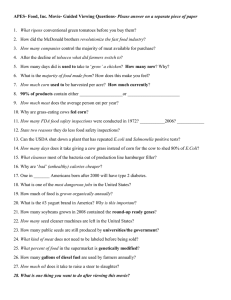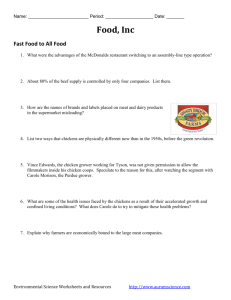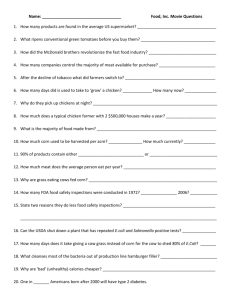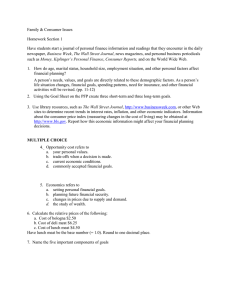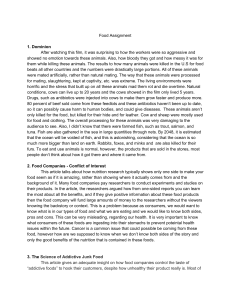English 102 Potential Research Topics: A Place to Start
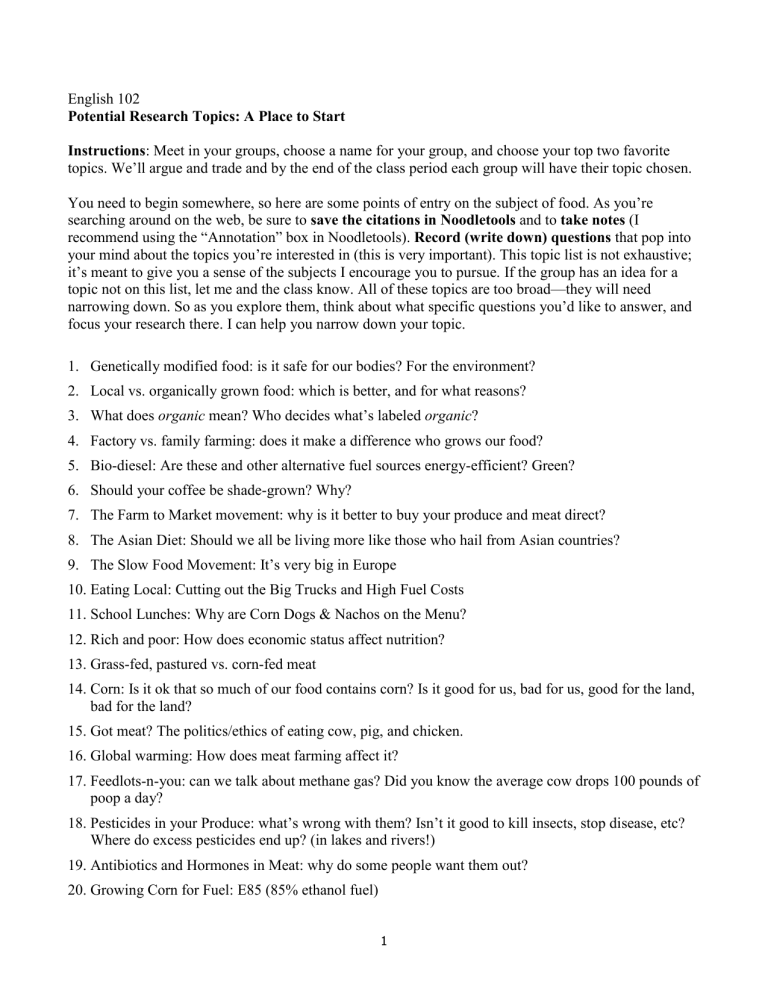
English 102
Potential Research Topics: A Place to Start
Instructions : Meet in your groups, choose a name for your group, and choose your top two favorite topics. We’ll argue and trade and by the end of the class period each group will have their topic chosen.
You need to begin somewhere, so here are some points of entry on the subject of food. As you’re searching around on the web, be sure to save the citations in Noodletools and to take notes (I recommend using the “Annotation” box in Noodletools).
Record (write down) questions that pop into your mind about the topics you’re interested in (this is very important). This topic list is not exhaustive; it’s meant to give you a sense of the subjects I encourage you to pursue. If the group has an idea for a topic not on this list, let me and the class know. All of these topics are too broad—they will need narrowing down. So as you explore them, think about what specific questions you’d like to answer, and focus your research there. I can help you narrow down your topic.
1.
Genetically modified food: is it safe for our bodies? For the environment?
2.
Local vs. organically grown food: which is better, and for what reasons?
3.
What does organic mean? Who decides what’s labeled organic ?
4.
Factory vs. family farming: does it make a difference who grows our food?
5.
Bio-diesel: Are these and other alternative fuel sources energy-efficient? Green?
6.
Should your coffee be shade-grown? Why?
7.
The Farm to Market movement: why is it better to buy your produce and meat direct?
8.
The Asian Diet: Should we all be living more like those who hail from Asian countries?
9.
The Slow Food Movement: It’s very big in Europe
10.
Eating Local: Cutting out the Big Trucks and High Fuel Costs
11.
School Lunches: Why are Corn Dogs & Nachos on the Menu?
12.
Rich and poor: How does economic status affect nutrition?
13.
Grass-fed, pastured vs. corn-fed meat
14.
Corn: Is it ok that so much of our food contains corn? Is it good for us, bad for us, good for the land, bad for the land?
15.
Got meat? The politics/ethics of eating cow, pig, and chicken.
16.
Global warming: How does meat farming affect it?
17.
Feedlots-n-you: can we talk about methane gas? Did you know the average cow drops 100 pounds of poop a day?
18.
Pesticides in your Produce: what’s wrong with them? Isn’t it good to kill insects, stop disease, etc?
Where do excess pesticides end up? (in lakes and rivers!)
19.
Antibiotics and Hormones in Meat: why do some people want them out?
20.
Growing Corn for Fuel: E85 (85% ethanol fuel)
1
21.
Do artificial sweeteners help or hinder weight loss? Are they as bad for you as some say?
22.
The Obesity Epidemic: What’s causing it? Screen time? Modern Conveniences? Overeating?
23.
Food Corporations (McDonald’s, ConAgra, General Mills, etc.): why do some people consider them untrustworthy?
24.
Marketing Food to Children: A $1.6 billion enterprise
25.
Do we have enough land/resources to feed the world? Ask Francis Moore Lappe.
26.
The case for vegetarianism: who wants to eat carcasses anyway?
27.
The case for being an omnivore: didn’t we evolve from hunter-gatherers?
28.
The banning of trans fats. Should the rest of the nation follow New York City’s lead and ban them in all foods, including those sold in local bakeries and restaurants?
29.
Vending Machines in Public Schools: Get the Soda and Junk Food out of there!
30.
What happened to gym (phys ed)?
31.
Is being overweight dangerous, or are we just obsessed with being thin? What is a healthy weight? A healthy diet?
32.
Should we limit the places where fast food restaurants are allowed to open? The L.A. City Council did just that, placing a one-year moratorium on new fast food restaurants opening in South L.A., where obesity is epidemic.
33.
Should there be laws limiting the consumption of sugary drinks?
34.
The French Paradox: How come they live on croissants and buttery sauces and aren’t as obese as a nation?
35.
Fad Diets (Zone, Atkins, South Beach, etc.): why do we need a gimmick to lose weight?
36.
What does “natural” mean? Are nature’s chemicals superior to those produced in a lab?
37.
Super Foods: What are they and why do we need to eat more of them?
38.
Chicken of the Sea: Are fish and shellfish populations in danger? Are there better ways to harvest?
How can we keep from depleting all the fish in the sea?
39.
Baby Formula: is it Evil?
40.
How, when and why did all the chemicals get added to our foods? How are they good and how are they bad?
41.
Cricklets & Niblets: The Case for Eating Insects
42.
Abundant Plowing: There Goes Our Topsoil
43.
The case for and against eating horsemeat: What’s the big deal?
44.
Should farmers be allowed to save and plant GMO seeds? Maybe certain genetic modifications should be in the public domain.
45.
Farmed vs. Wild Salmon – does it make a difference?
2
